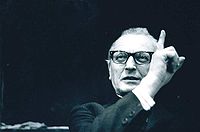
Paul Ariste
Encyclopedia

Estonia
Estonia , officially the Republic of Estonia , is a state in the Baltic region of Northern Europe. It is bordered to the north by the Gulf of Finland, to the west by the Baltic Sea, to the south by Latvia , and to the east by Lake Peipsi and the Russian Federation . Across the Baltic Sea lies...
n linguist
Linguistics
Linguistics is the scientific study of human language. Linguistics can be broadly broken into three categories or subfields of study: language form, language meaning, and language in context....
renowned for his studies of the Finno-Ugric languages
Finno-Ugric languages
Finno-Ugric , Finno-Ugrian or Fenno-Ugric is a traditional group of languages in the Uralic language family that comprises the Finno-Permic and Ugric language families....
(especially Estonian
Estonian language
Estonian is the official language of Estonia, spoken by about 1.1 million people in Estonia and tens of thousands in various émigré communities...
and Votic
Votic language
Votic or Votian is the language spoken by the Votes of Ingria. It is closely related to Estonian and belongs to the Finnic subgroup of Uralic languages. Votic is spoken only in Krakolye and Luzhitsy, two villages in the Kingisepp district, and is close to extinction...
), Yiddish and Baltic Romani language. He was born as Paul Berg, but in 1927 Estonized his name to Ariste. He graduated from the University of Tartu
University of Tartu
The University of Tartu is a classical university in the city of Tartu, Estonia. University of Tartu is the national university of Estonia; it is the biggest and highest-ranked university in Estonia...
and subsequently worked with it. Ariste wrote his M.A. thesis ("Eesti-rootsi laensõnad eesti keeles") on Swedish – viz. Estonian Swedish dialect – loanword
Loanword
A loanword is a word borrowed from a donor language and incorporated into a recipient language. By contrast, a calque or loan translation is a related concept where the meaning or idiom is borrowed rather than the lexical item itself. The word loanword is itself a calque of the German Lehnwort,...
s in Estonian, his doctoral thesis ("Hiiu murrete häälikud") treated the Hiiumaa dialect of Estonian language. From 1945 to 1946, Ariste was imprisoned by the Soviet authorities (for having been member of Veljesto, a student association in independent Estonia)
He was the head of the Finno-Ugrian Department at the University of Tartu and one of the two most instrumental personalities in reviving Soviet
Soviet Union
The Soviet Union , officially the Union of Soviet Socialist Republics , was a constitutionally socialist state that existed in Eurasia between 1922 and 1991....
Finno-Ugrian studies. Ariste founded the journal Sovetskoye finnougrovedeniye (Советское финноугроведение; Soviet Finno-Ugric Studies, later renamed Linguistica Uralica).
He was also a notable Esperantist
Esperantist
An Esperantist is a person who speaks or uses Esperanto. Etymologically, an Esperantist is someone who hopes...
, and a member of the Academy of Esperanto between 1963-67. He was also listed in a year 2000 issue of the Esperanto magazine La Ondo among the 100 most eminent Esperantists.
Further reading
- Ariste, Paul (1939). A quantitative language. Proceedings of the 3rd International Congress of Phonetic Sciences. Ghent. P. 276-280.
- Ariste, Paul (1953). Eesti keele foneetika [Phonetics of Estonian]. Tallinn: Eesti Riiklik Kirjastus.
- Ariste, Paul (1960). Vadjalaste laule. Tallinn.
- Ariste, Paul (1968). A Grammar of the Votic Language. Bloomington: Indiana University. ISBN 9780877500247
- Ariste, Paul (1981). Keelekontaktid: Eesti keele kontakte teiste keeltega [Language contacts: Contacts of Estonian with other languages]. Tallinn: Valgus.
- Viitso, Tiit-Rein (2005). Paul Ariste 100. Linguistica Uralica No 1/2005, 1-3.
- Viitso, Tiit-Rein (2005). Some Comments about Paul Ariste's Doctoral Dissertation on Phonetics of Hiiumaa Estonian Dialects. Linguistica Uralica No 1/2005, 4-19.

